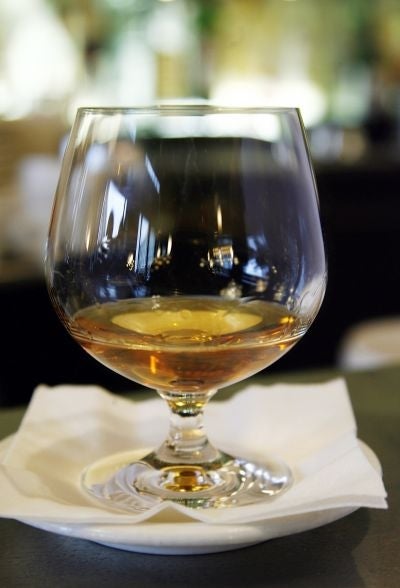France vaunts '40 virtues' of Armagnac

Your support helps us to tell the story
From reproductive rights to climate change to Big Tech, The Independent is on the ground when the story is developing. Whether it's investigating the financials of Elon Musk's pro-Trump PAC or producing our latest documentary, 'The A Word', which shines a light on the American women fighting for reproductive rights, we know how important it is to parse out the facts from the messaging.
At such a critical moment in US history, we need reporters on the ground. Your donation allows us to keep sending journalists to speak to both sides of the story.
The Independent is trusted by Americans across the entire political spectrum. And unlike many other quality news outlets, we choose not to lock Americans out of our reporting and analysis with paywalls. We believe quality journalism should be available to everyone, paid for by those who can afford it.
Your support makes all the difference.France's oldest spirit, Armagnac, is celebrating its 700th birthday with a new marketing push vaunting its "40 virtues" as a drink that is good for the body and good for the soul.
The first mention of Armagnac dates back to 1310 when Prior Vital Dufour wrote a treaty on medicine in which he laid out the 40 virtues of the liqueur produced in southwest France.
"This water, if taken medically and soberly is said to have 40 virtues," wrote Dufour. "It enlivens the spirit, if taken in moderation, recalls the past to memory, renders men joyous, preserves youth and delays senility."
Dufour also credited the amber-coloured brandy with curing hepatitis and "drying tears".
A group of Armagnac producers from the spirit's home region will travel to the Vatican next month to bring back a copy of the treaty considered a near-sacred text for distillers.
The document has been preserved in the Holy See's library since 1531.
From the Vatican, producers then fan out across Europe and the United States to win over new fans, in New York, Chicago, London and in Russia, currently the biggest export market for Armagnac.
France sold 6.5 million bottles of Armagnac abroad in 2008, a small slice of the worldwide market for spirits and far behind the highly-popular Cognac, now the drink of choice for American rappers.
"Armagnac is not a bar drink," said Pierre Tabarin, president of the Armagnac producers' association.
"This is a spirit for connoisseurs, for gourmets attached to the traditional values of French gastronomy."
Producers are hoping to boost annual export sales to between nine and 10 million bottles by 2013 and in particular win over the thirtysomethings who have shied away from the spirit.
"Today's consumer is on average aged 50 or 60. We want to tap into a younger clientele and draw in consumers in their 30s," said Tabarin.
Armagnac is mostly considered a digestive liqueur, but producers would like it to offered as an aperitif and - why not - be added to the cocktail list.
It could also be served as an accompaniment to some hearty dishes like foie gras.
"You can enjoy anything with Armagnac," argued Tabarin. "It goes well with roquefort cheese, salmon, foie gras and even caviar."
In 2007, producers came out with the new "Blanche d'Armagnac", the unaged eau-de-vie that they are hoping can compete with colourless spirits like vodka.
Producers have recently met with leaders of the Slow Food movement to make the point that they too contribute to good, healthy, clean cuisine.
"It's really a shame to confine Armagnac to being a digestive. It can be very nice before or after a meal," said Sebastien Lacroix, director of the trade group of 800 vineyards in the Armagnac producing-region.
"After all, Scotch managed to become an aperitif, why not Armagnac?" he said.
Constantin Georgacaracos, whose family has for seven generations produced Armagnac near Eauze in the Gers region, complained that price was holding back sales.
"There are too many taxes," he said. "This is supposed to combat alcoholism, but no one gets drunk on Armagnac." Prices vary greatly depending on quality, but some lower-end brands sell for as little as 40 euros (54 dollars).
Last year brought trying times for Armagnac producers but the 700th anniversary is seen as an opportunity to celebrate a fine French delicacy.
Armagnac accounts for 0.04 percent of worldwide sales of spirits while Cognac takes one percent of the market, according to the BNIA trade group of Armagnac producers.
For many years, Britain was the main export market for Armagnac, but Russia has recently moved in and taken up the top spot.
The brandy is distilled from white wine grapes and is aged in casks made from black oak.
Join our commenting forum
Join thought-provoking conversations, follow other Independent readers and see their replies
Comments